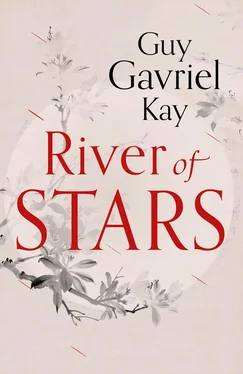They forgot something, though, heading north. They really did forget something.

In a springtime before that northern march took place, a girl was walking beside her father amid chaos and excitement in a very crowded city.
You could declare it madness, a collective fever, the way in which Yenling, second city of the empire, was transformed during the Peony Festival.
Every spring, for the two weeks when the king of flowers bloomed, it became nearly impossible to move along Yenling streets and lanes, or find a room at an inn.
Houses great and small were filled with returning family and guests from out of town. People offered space, three or four to a bed or a pallet on the floor, to strangers for considerable sums. A place to sleep for a delirious spring interlude, before normal life resumed.
There was nothing resembling normal life during the festival.
Long Life Temple Road all the way down to the principal western gate, and both sides of Moon Dike Road, were crowded with hastily erected tents and pavilions selling peonies.
Yao Yellows (affectionately called “The Palace Lady”) and Wei Reds cost thousands of cash for a single perfect blossom. Those were the most glorious graftings, the celebrated ones, and only the wealthiest could claim them.
But there were less extravagant varieties. Zuo Purple and Hidden Stream Scarlet, Sash Maroon, the Nine Petal Pearl, the exquisite, tiny petals of the Shuoun. Ninety different kinds of peony could be found in Yenling as the sun returned in spring, their blooming an occasion for joy, whatever else might be happening in the empire, on its borders, in the world.
When the first blossoms appeared a postal express began, racing east each morning along the reserved middle lane of the imperial road. There were six stations between Yenling and Hanjin. A fast relay of riders and horses could do it in a day and a night, carrying flowers, so that the Son of Heaven might share in the glorious splendour.
Yenling had been celebrated for its peonies for more than four hundred years, and the peony had been the imperial flower for longer than that.
It was derided by ascetic philosophers, declared to be artificial—peonies were grafted, constructed by man, not natural. It was disdained as gaudy and sensuous, too seductively feminine to justify exaltation, especially compared to the austere, masculine bamboo or flowering plum.
These views were known but they didn’t matter, not even at court. The peony obsession had become a supreme case of popular wisdom (or madness) overriding the reflections of sages.
Everyone who could came to Yenling at festival time.
People walked the streets with flowers pinned to their hats. Aristocrats were carried in their chairs, and so were high-ranking members of the civil service in their long robes. Simple tradesmen crowded the lanes, and farmers pushed into the city to see the flowers and the entertainment.
The more important gardens made a great deal of money for their owners as peonies were sold outside their gates or along the streets.
The Wei family, those artisans of the flower, charged ten cash just to enter their walled garden and take the small boat across to the island in the pond where their best peonies were grown. The family hired guards; you were beaten if you touched a blossom.
There was immense skill to the grafting of the flawless, redolent blossoms. People paid to walk along winding paths to see and smell the profligate profusion. They would line up for hours, then come back to see the changes from one day to the next.
Even women were among them, bright blossoms in their hair. This was a time of year, and a place—Yenling during the Peony Festival—when the increasing restrictions on women’s movements were superseded, simply because they could not be enforced.
It was springtime. There were loud, excited crowds and the heady scent of extravagantly coloured blossoms. There was flute music, singing, dancers in the streets, jugglers, storytellers, men with trained animals. Wine and food were sold in booths, throngs given over to merriment—and to undeniably immoral behaviour in courtyards and lanes and bedchambers (not only in the pleasure district) as twilight descended each day.
Another reason for philosophers to lament the folly and the flower.
WALKING BESIDE HER FATHER, Shan is dizzy with excitement and trying not to show it. That would be undignified, childlike.
She is concentrating on seeing everything, taking it in, registering details. Songs succeed (or fail) in the details, she believes. They are more than the pairing of words and music. It is the acuteness of observation that sets a work apart, makes it worth … worth anything, really.
She is seventeen years old this spring. Will be married by this same season next year. A distant thought still, mostly, but not a displeasing one.
But right now she’s in Yenling with her father amid the morning crowds of the festival. Sight, sound, smell (flowers everywhere and a heavy crush of bodies; the glory and the assault, she thinks). She is hardly the only woman here, but she’s aware of people looking at her as she and her father make their way back up Long Life Temple Road from the city wall.
People had begun looking at her about two years ago. One would have to be in love or a poet to name her beautiful, but there seems to be something about the way she walks or stands, the way her gaze moves and then settles on objects or on people, that draws the attention of others back to her. She has wide-set eyes, a long nose, long fingers. She is tall for a woman. She gets the height from her father.
Lin Kuo is an extremely long-limbed man, but so self-effacing he has stood with a slight stoop for as long as his daughter can remember—as if denying any proud assertion of height, or endlessly ready to bow respectfully.
He had passed the jinshi examinations on his third attempt (perfectly honourable) but has never received a posting, even to the provinces. There are many men like that, graduates without a position. He wears the robes and belt of a civil servant and carries the title of court gentleman, which just means he is without office. He claims the monthly salary attached to that title. He writes with perfectly acceptable calligraphy, and has just completed (and had printed) a small book on gardens in Yenling, which is why they are here.
He has no obvious enemies—important these days—and seems to be unaware that he’s considered a figure of amusement by some. His daughter, more observant perhaps, has registered this, however.
He is instinctively kind, a little afraid of the world. His only expression of adventurousness lies in the fact that he has educated his one living child as if she were a boy. Not a trivial decision, not without consequence, if one thinks of individual lives as important.
Shan has read the classics and the poets, major and minor, back to the beginnings of writing in Kitai. She has a very good running hand and an even better formal one. She sings, of course, can play a pipa —most women from good families can do that—but she also writes songs, the new ci form emerging in this Twelfth Dynasty, words grafted (like peonies! she suddenly thinks) to well-known melodies of the countryside or the pleasure districts.
Her father has even had bows made for each of them, with a supply of arrows. They’ve taken lessons together from a retired archer he found, another quiet reaction against the customs of the day, where all well-bred men (let alone their daughters!) loftily disdain all military traditions.
It is not proper for a girl to do any of this, of course. In music they are to pluck a pipa fetchingly, and sing the words men write. The women doing such singing tend to be entertainers and courtesans. It has always been so.
Читать дальше













